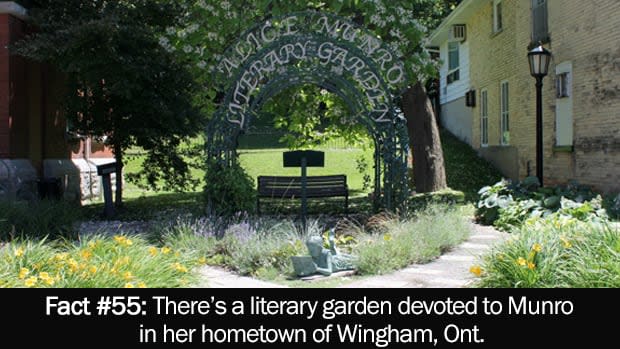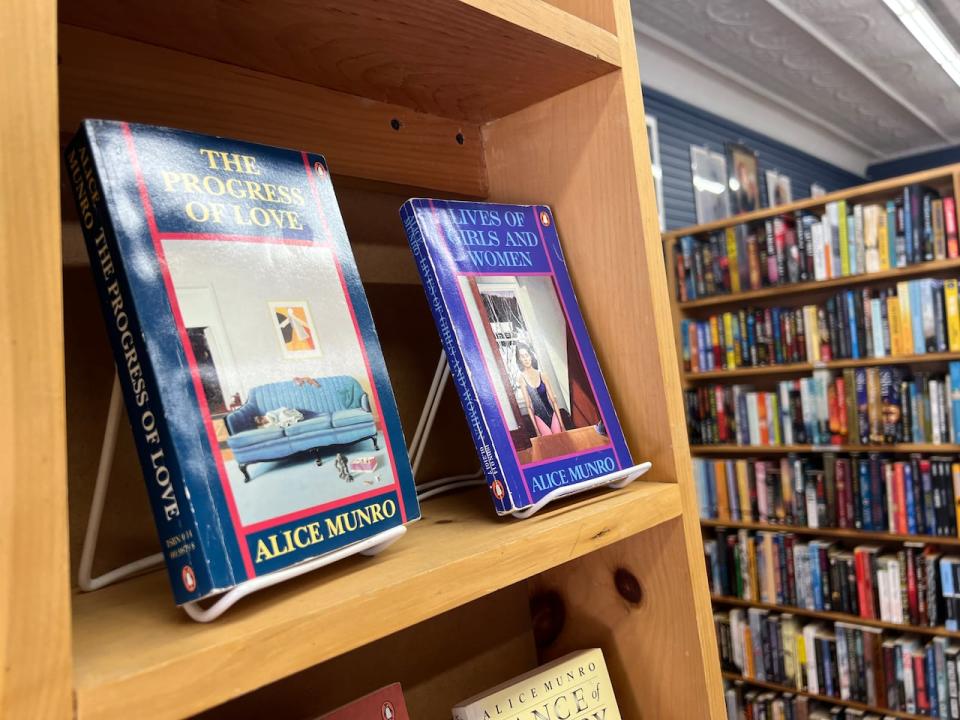Writer Alice Munro revered for elevating the everyday in southwestern Ontario
- Oops!Something went wrong.Please try again later.

When Verna Stettler and her friends in the Wingham Horticultural Society came up with the idea of creating an Alice Munro Literary Garden, their motivations were simple.
"I'm a firm believer that you should appreciate people while they're alive," said Stettler. "I thought really and truly we should do something for Alice for what she's done for this town. She was very proud to be from Wingham, Ontario."
Alice Munro, a Canadian writer who earned international acclaim and a Nobel Prize as a master of the modern short story, died Monday evening. She was 92.
She leaves behind a massive literary legacy as one of Canada's finest fiction writers.
But for Stettler, the way Munro embraced the garden project says a lot about her reverence for the simple things, the essential elements of small town living and everyday lives that she so skillfully elevated in her stories.
When Stettler began work on the literary garden in Munro's name, it was the early 2000s. At the time, Munro lived in nearby Clinton, Ont., and would meet with friends in the area.
The garden was planned for a small plot in Wingham, a farming community of about 3,000 people and the place where Munro was born.
Stettler was elated when Munro not only gave her support for the garden, but also collaborated in its planning.
Munro shared with Stettler how the spot in downtown Wingham where the garden was eventually planted had been the scene of a memorable incident decades before.
"She told me that when she was a girl, she was riding her bicycle down the hill and the chain flew off," said Stettler. "She wasn't going to be able to stop at the corner, but she managed to wheel around the corner and the bike finally stopped right where we put the garden."
There wasn't much of a budget for the project, but when people heard it was for Munro, they quickly offered to pitch in.
"We asked for donations and they came in from all over the country to pay for the garden," said Stettler.
The garden opened in 2002. Later, when acclaimed poet and novellist Margaret Atwood came to visit Munro in Wingham, Munro made a point of taking her to the garden.

A photo of the Alice Munro Literary Garden in Wingham, Ont. (Courtesy of North Huron Museum)
Stettler and Munro became friends over the garden planning.
"I'd read some of her books before I knew her, now I've read them all," she said.
The friendship continued for years. Munro eventually moved to Port Hope to be closer to her daughter.
And although Munro won a much-coveted Nobel Prize for her work in literature, Stettler will remember her friend as a humble, gentle person who loved small-town living and wasn't one to revel in her own fame.
"She would often to go visit her friends who were in care homes and read to them," said Stettler.

Jim Seale helps organize an annual conference celebrating Alice Munro's work in Huron County. 'She shaped what it means to be a short story writer and what it means to write a modern short story,' he said. (Submitted)
Jim Seale is a librarian in Huron County, which includes Clinton and Wingham. He's also on the steering committee of the annual Alice Munro Festival of the Short Story, a four-day celebration of Munro's work that happens in June.
Seale said Munro's gift was her ability to surface the complications and inner conflicts of everyday people.
"She was very good at looking at real people, not people who were in positions of power," he said. "As time goes on, those stories are an amazing artifact to what it was like to live in our neck of the woods: Huron County, southwestern Ontario or just rural Canada. It's wonderful to be able to have such an intimate portrayal of these people."
An academic at Western University said Munro's mastery of the short story helped set aside ideas that it was a lesser literary form than the novel.
"Alice Munro could put more into 30 or 40 pages than most novellists could get into 400," said Jan Plug, a professor in the university's department of English and Writing studies.
"When you read her carefully it was hard to see how she did it, she was so masterful."

Attic Books in London, Ont., creates a special display of Alice Munro’s books shortly after news broke of her death. (Andrew Lupton/CBC)
In London, Ont., hours after news broke of Munro's death, special displays of her books were set up at Attic Books on Dundas Street and at the Central Library in downtown.
Plug said her stories were profound, but also written in a way that made them accessible to any reader.
"People who might not have thought of themselves as readers of literature, still found something in Munro," said Plug. "There's a kind of straight forward, clear-eyed quality to her writing that one doesn't find often."

